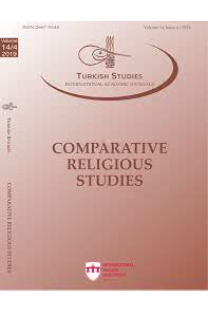Bir Aforoz Hikayesi: Tolstoy-Rus Ortodoks Kilisesi İlişkisi
A Story of Excommunication: Tolstoy-Russian Orthodox Church Relationship
___
- Bartlett, R.(2017) (çev: Zafer Avşar) Tolstoy Bir Rus Hayatı, Everest Yayınları.
- Birukoff, P.(1911), The Life of Tolstoy, Cassell and Company Limited.
- Canney M. A.(1921), An Encyclopedia of Religions, George Routledge Sons Ltd.,E.P. Dutton Co.
- Christian, R. F.(1985), Tolstoy’s Diaries, The Athlone Press, cilt 1.
- Christoyannopoulos A. (2016) “Leo Tolstoy’s Anticlericalism in Its Context and Beyond: A Case against Churches and Clerics, Religious and Secular”, Religions, 7(59), 1-20.
- Çetinkaya A. (2020) İncil’e Farklı Bir Yaklaşım: Tolstoy Örneği, On Dokuz Mayıs Sosyal Bilimler Enstitüsü Basılmamış Yüksek Lisans Tezi.
- Demirci, K. (2005). Bir Hristiyan Mezhebi Olarak Ortodoksluğun Teolojisi, Ayışığı Kitapları.
- Dualı Ş. M. (2013) “Rus Ortodoks Kilisesi’nin Siyasal Tarihi”, Milel ve Nihal: İnanç, Kültür, ve Mitoloji Araştırmaları Dergisi, 10(2), 64-78.
- Faminow P. S. (1995) “A View From Within: Tolstoy and Resurrection”, Spirit Wrestlers: Centennial Papers in Honour of Canada's Doukhobor Heritage (ed: Koozma J. Tarasoff K. J. -Klymasz R. B.) içinde (s. 21-22), Canadian Museum of Civilization.
- Kolsto P. (2001) “A Mass for a Heretic? The Controversy over Lev Tolstoi’s Burial”, Slavic Review, 60(1), 75-95. https://doi.org/10.2307/2697644
- Kosto, P. (2006) “The Demonized Double: The İmage of Lev Tolstoi in Russian Orthodox Polemics”, Slavic Review, 65(2), 304-324. https://doi.org/10.2307/4148595
- Maude, A. (1918). Leo Tolstoy. Methuen Company.
- Nash J. V.,(1929) “The Religious Evolution of Tolstoy”, The Open Court, 43(11), 641-667.
- Özdemir R.-Ünsal Ö. (2017) “Nehlüdov'un Ruhsal Değişimi Işığında Tolstoy'un Dünya Görüşü”, Atatürk Üniversitesi Edebiyat Fakültesi Dergisi, (59), 129-136.
- Palmieri A. (1915), The Russian Doukhobors and Their Religious Teachings, The Harvard Theological Review, 8(1), 62-81.
- Reşat Nuri, (1933) Tolstoy Hayatı ve Eserleri, Kanaat Kütüphanesi.
- Rolland, R. (1911) (çev: Bernard Miall), Tolstoy, E.P. Dutton Company.
- Shubin, D.H. (2005). A History of Russian Christianity. Algora Publishing, cilt 3.
- Stepun F. (1960) “The Religious Tragedy of Tolstoy”, The Russian Review, 19(2), 157-170. https://doi.org/10.2307/126738
- Sushkova Y.N.,(2016) “Lev Nikolayevich Tolstoy: Political and Legal Views and Protection of Religious Rights”, European Research Studies, 19(3/B), 111-130.
- Şahin M. S.(1988), “Aforoz”, Diyanet İslam Ansiklopesi, cilt 1, Türkiye Diyanet Vakfı Yayınları.
- Thurber, E. A. (1914). “Tolstoy’s Religion”, The Open Court, 28(1), 1-12.
- Tolstoy Lev (1934) “Press Preface to The Christian Teaching”, (çev: Aylmer Maude) On Life And Essays On Religion içinde (s. 209-214), Oxford University Press.
- Tolstoy Lev (1934) “A Reply to The Synod’s Edict of Excommunication”, (çev: Aylmer Maude) On Life And Essays On Religion içinde (s. 214-225), Oxford University Press.
- Tolstoy Lev,(2015) (çev: Ayşe Hacıhasanoğlu), Diriliş, Türkiye İş Bankası Kültür Yayınları.
- Tolstoy Lev (2017) (çev: Kayhan Yükseler), İncil’in Kısa Bir Özeti, Everest Yayınları.
- Tolstoy Sergey(1990),(çev: Emine Opan), Oğlu Tolstoy’u Anlatıyor, Düşün Yayınevi.
- Tolstoy Sofiya (1985) (çev: Muzaffer Kuşuloğlu), Sofiya Tolstoy’un Güncesi, Düşün Yayınevi.
- Troyat H. (2010) (çev. Z. Canan Özatalay-Işık Ergüden) Lev Tolstoy, İletişim Yayınları.
- ISSN: 2667-5544
- Yayın Aralığı: 4
- Başlangıç: 2006
- Yayıncı: ASOS Eğitim Bilişim Danışmanlık Otomasyon Yayıncılık Reklam Sanayi ve Ticaret LTD ŞTİ
Arap Dilinde Cevap Harfleri: Kullanım Şekilleri ve Dilbilgisi Açısından Tahlili
Mehmet Ali Kılay ARAZ, Mahamadou KEITA
Osmanlı Devleti’nde Ruhsatsız Olarak İnşa Edilen Kilise, Manastır, Havra ve Mektepler
Şehit Yakınlarının Yas Deneyimine İlişkin Fenomenolojik Bir Araştırma
Mâtürîdî Kelâm Sisteminin Dini Tefekkür Dünyamıza Etkisi
Şeyh Ahî Dâ‘î Fütüvvetnâmesi’nde Ahlâkî Değerler
Din Eğitimi Açısından Çocuğun Hakkını Korumada Ailenin Sorumluluğu
